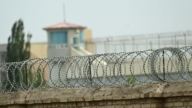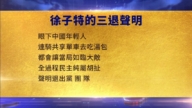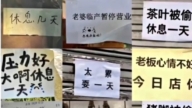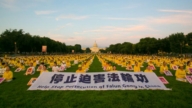【新唐人2011年9月19日讯】在大陆颇有人气的《湖南卫视》王牌选秀节目《快乐女声》,今年(2011年)的总决赛刚刚落幕,就被国家广电总局以“节目严重超时”为名,勒令明年不得再办。评论指出,民众喜欢什么,广电总局就禁止什么,中共当局对文化领域的管制越来越残酷。请看报导。
《快乐女声》是《湖南卫视》的王牌选秀节目,这个节目的前身是曾在中国电视界掀起旋风的《超级女声》。但9月16号,2011年度的《快乐女声》总决赛却在匆忙中落下帷幕。
《湖南卫视》内部人员透露,广电总局规定,今年(2011年)的选秀节目不准哭,不准观众短信投票。 《快乐女声》比赛需要150分钟,但广电总局只允许90分钟。这些规定导致《快乐女声》面临很多困难,最终的总决赛也因此被严重缩水。
赛后,《湖南卫视》总编室主任李浩向媒体证实,因为节目超时等原因,国家广电总局通报,停止《湖南卫视》明年(2012年)举办类似选秀节目。 “超女”“快女”成为绝唱。一个月前,《湖南卫视》就曾因为“快女”比赛严重超时,受到广电总局的处罚,甚至电视台台长被迫亲自前往北京“请罪”。
多年来,广电总局对各电视台的娱乐节目下达了很多禁令,被通称为“限娱令”。这些规定包括:省级卫视每年只能有一档选秀节目,播出时间不能超过两个月,播出次数不超过10次,黄金时段不准播出,每场播出不许超过90分钟等。
《南方周末》报导,即将出台的“加强版限娱令”,从原来的10条增加到16条,新增禁令包括:下午5点到晚上10点,娱乐节目每周不能超过3次;邀请港台嘉宾要上报审批等。
大陆文化评论家叶匡政:“目前这个限娱令,据各电视台说,还没有(正式文件)下发到他们手里,但是已经内部通告了。对《快乐女声》超时的处罚,我估计也就是限娱令的第一步。”
9月16号,广电总局通报,河北石家庄电视台的情感故事类栏目《情感密码》,放大扭曲的伦理道德观,造成严重不良影响,暂停石家庄电视台影视频道一个月。
《网易》网民则回应“现实比电视节目残酷10倍! ”,这一跟帖获得了近万人的支持。也有网友质问广电总局:电视节目是否“扭曲价值观”,是否“误导”,交给我自己判断好吗?
叶匡政:“目前的这种文化管制就是,民众喜欢什么,它(广电总局)就禁止什么,变得非常荒唐。我不知道,它颁发这种禁令,是想把民众逼向什么地方。最起码,按照我们正常的文化理解来说,至少娱乐节目不会给社会带来颠覆,不会给社会制造动乱。”
广电总局对各省级卫视作出很多限制,但对《央视》却没有相关规定。北京外国语大学新闻学教授展江对香港《明报》表示,《快乐女声》的收视率比《央视》节目要好,广电总局是在维护《央视》的利益。
那么,民众为什么不喜欢央视的节目呢?
叶匡政:“就是凡是在《央视》播的节目,它有一个非常重要的特征,就是它是对国家(中共)意志的强调,它代表的是国家(中共)意志的声音。所以,民众对《央视》播出的这种节目,肯定是非常反感的,不喜欢看。因为你如果生活在这个社会的话,你就很容易看出这种节目的虚假来。无论是娱乐节目也好,还是电视剧也好,还是新闻节目也好,它都是一脉相承的。”
2004年,《湖南卫视》首推“超级女声”选秀节目,成为中国电视界的选秀鼻祖,被民众封为“娱乐王”。 《湖南卫视》也因此屡屡成为广电总局的封杀目标。
叶匡政:“民众为什么喜欢看娱乐节目?不是喜欢看,是被逼的。因为它(当局)把黄金时段所有民众感兴趣的题材全部禁止了,那你只有看娱乐节目。当民众喜欢看娱乐节目的时候,它又把娱乐节目禁止了,那么我相信,各地卫视仍然会动脑子,生产出另外一种类型的节目。”
《华商晨报》报导,《湖南卫视》总编室主任李浩表示,《湖南卫视》正在研究新的节目来代替选秀节目,但到底是什么节目,目前还不方便透露。
新唐人记者朱智善、李谦、周天采访报导。
‘Fast Girls’ Needs “Serious Time-Out”
A very popular talent show, ‘Fast Girls’ held by Hunan TV
has just ended its 2011 Finals, but was soon banned
by State Administration of Radio, Film and Television
(SARFT) of CCP’s (Chinese Communist Party) authorities.
SARFT claimed that the show needed “a serious time-out,”
and prohibited its broadcast in the next year.
Comments point out that what SARFT banned
is just another of the civilians’ favorite shows.
This reveals how the CCP authorities have tightened
control over culture more brutally than ever.
The talent show Fast Girls is Hunan TV’s ace program,
formerly known as ‘Super Girl,’ that stirred the TV industry.
However, on September 16, the Fast Girls 2011 Finale
was ended in a hurry.
An insider at Hunan TV reveals that SARFT prohibits
contestants of talent shows 2011 to cry,
and audiences are not allowed to vote via SMS.
The Finale of Fast Girls needed 150 minutes to finish
the final episode, but SARFT only granted 90 minutes.
This restriction created many difficulties for Fast Girls
in the Finale, and it turned into a quick run-through.
After the contest, Li Hao, Editorial Department Director
at Hunan TV, confirmed to the media that due to “time-out,”
SARFT ordered Hunan TV to discontinue
similar talent shows in 2012.
Super Girl and Fast Girls contestants
thus sung their last songs.
A month ago, Hunan TV was punished by SARFT
for the talent show Fast Girls,
with the president of Hunan TV forced to go to Beijing
to “confess his sins.”
Over the years, SARFT issued many bans over game
shows of TV stations across China. These bans are known
as Game Show Limit Order, stating that provincial TV
stations are allowed to have only one talent show annually.
The broadcast time is within two months and the episodes
can be broadcast no more than 10 times.
The game shows are not allowed to broadcast in primetime,
and each game show can’t exceed 90 minutes.
Southern Weekend reported that the forthcoming ‘Game
Show Limit Order Pro’ added another 6 bans, to 16 in total.
The new bans state that between 5 and 10 p.m. week days,
game shows’ broadcasting can be up to three times.
Plus, prior to inviting guests from Hong Kong and Taiwan,
TV stations should acquire the authorities’ approval.
Ye Kuangzheng (Cultural Critic): “Many TV stations said
that they haven’t received the official copy
of this Game Show Limit Order,
but have been informed internally.
I believe that the sanction of Fast Girls’ time-out
was the first step towards fulfilling this order.”
On September 16, SARFT ordered Shijiazhuang TV’
film channel to suspend its broadcasting for a month.
SARFT said that Shijiazhuang TV’s story program
‘Emotional Cipher,’ “amplified a distorted ethical view,
and caused serious adverse effects.”
A netizen on 163.com responded by an online post,
“The reality is 10 times crueler than the TV shows!”
The post received support of nearly ten thousand
netizens. They questioned SARFT:
“Whether a TV show displays distorted values or not,
whether it is misleading or not, can you let us be the judge?”
Ye Kuangzheng: “The current control over culture
is that SARFT prohibits any programs
that civilians like, very absurdly. I can’t imagine where
authorities aim to drive civilians by issuing this limit order.
In accordance with our normal understanding of culture,
the game shows at least will not subvert the whole society,
and will not create social unrest.”
SARFT made a lot of restrictions on provincial TV stations,
but has not exerted similar regulations to CCTV.
Hong Kong’s Ming Pao reported that Zhan Jiang,
a journalism professor at Beijing Foreign Studies University,
said that Fast Girls has better ratings than CCTV programs,
and SARFT is actually safeguarding CCTV’s interests.
Then why don’t Chinese civilians like CCTV programs?
Ye Kuangzheng: “All CCTV programs have the same
feature. An emphasis on the CCP’s will.
All CCTV programs are CCP’s voices.
Certainly civilians detest them very much,
they don’t like watching such types of programs.
Because if you live in this society, you can easily
see through the falsehoods of CCTV’s programs,
whether they are game shows or TV series or news reports,
they all have the same purpose.”
Hunan TV launched the talent show Super Girl in 2004,
becoming the talent show originator in China’s TV industry.
Hunan TV was entitled Entertainment King. But since then,
Hunan TV has frequently become SARFT’s block target.
Ye Kuangzheng: “Why people like watching game shows?
In reality, they don’t like to, but were forced to watch them.
As authorities have banned all civilians’ favorite programs
in primetime, they have left civilians with only one choice.
To watch game shows. But when people started
liking game shows, authorities banned them, too.
I believe that TV stations across China are creative enough
to produce another type of programs.”
Chinese Business Morning News reported that Hunan TV’s
Editorial Department Director Li Hao
said that Hunan TV is working on a new program to replace
the previous. Details on it cannot be disclosed currently.
NTD reporters Zhu Zhishan, Li Qian and Zhou Tian




























